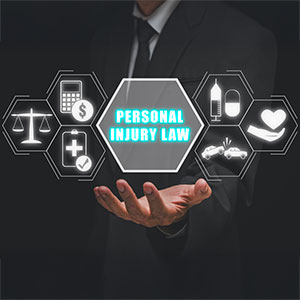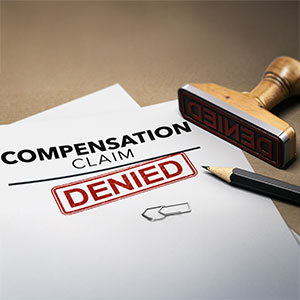The Crucial Role Of Legal Counsel
Personal InjuryThe Importance Of Legal Counsel In A Personal Injury Case
When it comes to a personal injury claim, knowing the right steps to take can significantly impact the outcome of your case, whereas missteps can result in not only wasted time but also lost resources that could be better invested in your legal strategy. The truth is, these cases are very complex, and having an experienced litigator by your side can make all the difference.
One of the most important benefits of working with an experienced attorney is that they will have a good idea as to how much your case is actually worth. If you forgo an attorney, the defense will likely try to take advantage of your ignorance with what seems like a generous settlement offer that is, in fact, worth mere pennies on the dollar.
So, how do you know the true value of your claim? Determining the value of your case is complex and hinges on several key factors:
- The Severity Of The Accident
- The Nature & Extent Of Injuries You’ve Incurred.
- Your Current & Anticipated Medical Expenses
- The Impact On Your Quality Of Life
- Any Long-Term Disability Or Impairment
What You Really Need To Know About Litigation
It’s easy to understand why working with an experienced personal injury attorney is a must – but having a lawyer on your side who is a seasoned litigator will bring the chances of reaping the highest possible compensation award to another level. In part, this is because while many people use the term litigation to refer to the process of going to trial, going to trial is actually only one part of the overall litigation process.
The Role Of A Personal Injury Attorney
Attorneys who advocate for plaintiffs in personal injury cases wear many hats, distinguishing their roles from what’s required of those who defend the insurance and trucking companies. Since personal injury lawyers represent real individuals, they must embrace several key responsibilities throughout litigation, including:
- Client Evaluation: The initial role of a plaintiff’s injury attorney involves carefully listening to potential clients and discerning which have viable cases and which do not. This pivotal step requires assessing the merits of each potential claim.
- Building The Case: Following client intake, attorneys play a critical role in helping their clients construct a compelling case. This often involves collaborating with appropriate medical professionals to ensure clients receive the necessary treatment and documentation of their injuries.
- Offer Evaluation: As negotiations progress, personal injury attorneys must meticulously evaluate any settlement offers that arise. This assessment includes determining whether the offer adequately compensates the client for their damages and injuries.
- Litigation: In cases where negotiations fail to reach resolution, the attorney’s final role may escalate to litigation. This stage may even involve presenting their client’s case before the court.
Going To Trial: Understanding The Basics
In the recent past, the world of personal injury law has seen some pretty significant changes when it comes to how cases are handled. One of the most noticeable shifts is the decreasing number of cases that echo throughout the halls of a courtroom. This is not without reason – rather, it’s a response to several things. As you embark on your legal journey, understanding these dynamics can help you navigate the path toward resolution effectively, whether it leads to the courtroom or to a negotiated settlement.
The reality is that trial comes with a considerable price tag, involving expenses that range from legal fees to court charges, not to mention the fees for expert witnesses and other miscellaneous costs. With this financial burden in mind, many parties opt for alternative paths to dispute resolution, such as negotiation and settlement. These methods provide a way to reduce expenses while still addressing disputes effectively.
This decision to go to trial or seek an out-of-court resolution is heavily influenced by risk assessment. Both plaintiffs and defendants must weigh the potential outcomes and uncertainties tied to a trial. Negotiated settlements often appeal to those who prefer the predictability and control they offer compared to the unknowns associated with trial verdicts.
Because trials still remain a fundamental component of the legal process, having an attorney with trial experience in your corner is essential – regardless of how you choose to resolve your case. These attorneys possess the skills and knowledge needed to navigate the complexities of your case both in and out of the courtroom.
Tip: Work With Someone Who Is Selective
A seasoned trial lawyer typically won’t juggle a high number of cases in a year. This is particularly true for those who actively and ethically strive to secure the best possible resolutions on behalf of their clients. An overemphasis on trials can sometimes signify a reluctance to engage in negotiation and settlement efforts, which are often more efficient means of achieving client objectives.
Trial Vs. Settlement
In the early stages of your personal injury case, it’s natural to wonder whether the matter will ultimately go to trial. While statistics suggest your case will end with a settlement rather than via trial, it’s vital to recognize that personal injury cases are dynamic and evolve over time. At this point in your case, it’s essential not to become preoccupied with this consideration but instead to focus on navigating your case wisely.
Why? Because personal injury cases can take abrupt, unexpected turns, and positions may need to adjust accordingly as they do. So, flexibility is key. It’s best to avoid becoming entrenched in a position that puts you in a corner that you cannot maneuver out of. Instead, keep an open mind and be prepared to adapt as your case unfolds. The decision of whether to settle or proceed to trial is complicated, and there is no definitive right or wrong answer to the question. Each case presents unique considerations that must be taken into account, including the extent of injuries, the circumstances of the accident, and whether any settlement offers are on the table. It’s a decision that requires you to weigh various factors and align with your best interests.
Just remember: This process is not about worrying whether your case will go to trial; it’s about being prepared for whatever path it may take. Your attorney’s guidance and advocacy are your strongest assets throughout this journey and they should be available to advise you on your best options along the way. While the majority of personal injury cases reach settlements, it’s imperative for your personal injury lawyer to always keep an eye on how they can effectively prove their cases. Personal injury cases can be financially draining – with clients typically bearing the costs. Adopting a strategic, resource-conscious mindset off the bat is critical to ensure the highest chances of success.
I cannot emphasize enough how important it is for you and your attorney to lay solid groundwork from the outset of your case. However, this doesn’t imply that you should steer your case toward trial; it means your case should be prepared meticulously regardless of the course it runs, with a focus on gathering evidence, conducting thorough investigations, and engaging in meaningful negotiations.
For more information on The Importance Of Legal Counsel In A Personal Injury Case, a free initial consultation is your next best step. Get the information and legal answers you are seeking by calling (863) 243-6166 today.


